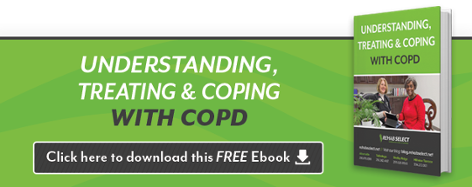 Coping with COPD means you can still live a full and active life, in most cases, despite the diagnosis. It takes pulmonary rehabilitation and careful attention to your lifestyle, diet, and physical fitness level.
Coping with COPD means you can still live a full and active life, in most cases, despite the diagnosis. It takes pulmonary rehabilitation and careful attention to your lifestyle, diet, and physical fitness level.
How does pulmonary rehabilitation help in coping with COPD?
- You can learn how to exercise safely and effectively
Coping with COPD isn't about sitting on the couch and being inactive. In fact, you must exercise in order to improve breathing, so that you can truly cope with COPD. Whether you're admitted to a skilled nursing facility for pulmonary rehabilitation as an inpatient or you participate as an outpatient, you will be taught how to exercise and improve your physical fitness without risking shortness of breath. Indeed, as you get more physically fit, shortness of breath should be less of a problem and you should be able to increase your physical activity accordingly, beyond what you can presently do.
In addition to access to an exercise physiologist, physical therapist, and other exercise specialists to help you develop and master your exercise program, you will also be given psychological support if you need it and will be taught how to continue your exercise program at home once you are discharged.
Exercise has more than just physical benefits as you learn to cope with your COPD. When you exercise, you release "feel good" hormones called endorphins, which naturally boost your mood. As you continue, you should also feel better simply because you see yourself getting stronger and learning how to cope effectively with COPD in such a way that its negative impact on your life is lessened.
- You'll receive psychological support
Depression and anxiety are common problems as you adjust to coping with COPD. Such mood problems can make life difficult for both you and your loved ones. As you participate in a rehabilitation program for COPD, you'll be given help and resources so that you can feel better not only physically, but emotionally and mentally, as well. Counseling and talk therapy can be a significant help, as can the exercise previously mentioned.
- You'll receive help with any lifestyle changes you'll need to make
Coping with COPD isn't just about learning how to exercise or to manage anxiety or depression. You'll also need to make some pretty significant lifestyle changes, in most cases, to truly manage your COPD. For example, you might need to quit smoking, and/or learn how to eat a healthier diet. Or, you may need to make use of oxygen therapy to live it's fully and actively as possible. COPD rehabilitation in a skilled nursing facility can help you make those changes with support so that you'll be fully familiar with them once you go home, and can stick with them after discharge.
- You'll receive help with medication and dosing
Coping with COPD may mean that you'll need to take medication you're not used to. When you enter a rehabilitation program focused on helping you manage your COPD, you will learn how to manage medications and prescriptions so that you take your medication faithfully; you'll also learn how to monitor medications' effects so that you can tell your doctor right away if something isn't quite right.
- You'll learn how to cope with and alleviate symptoms
One of the most pressing problems with COPD is the natural shortness of breath that comes with the disease. Unfortunately, this can be a vicious cycle – the more anxious you get, the more short of breath you may be. COPD rehabilitation therapy can teach you how to stop these frightening cycles in their tracks, through deep breathing techniques and other methods.





